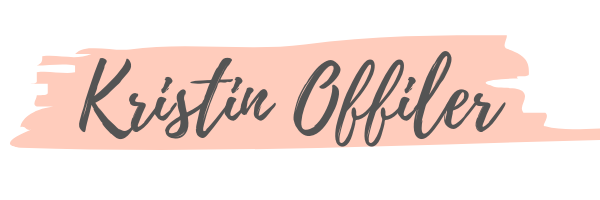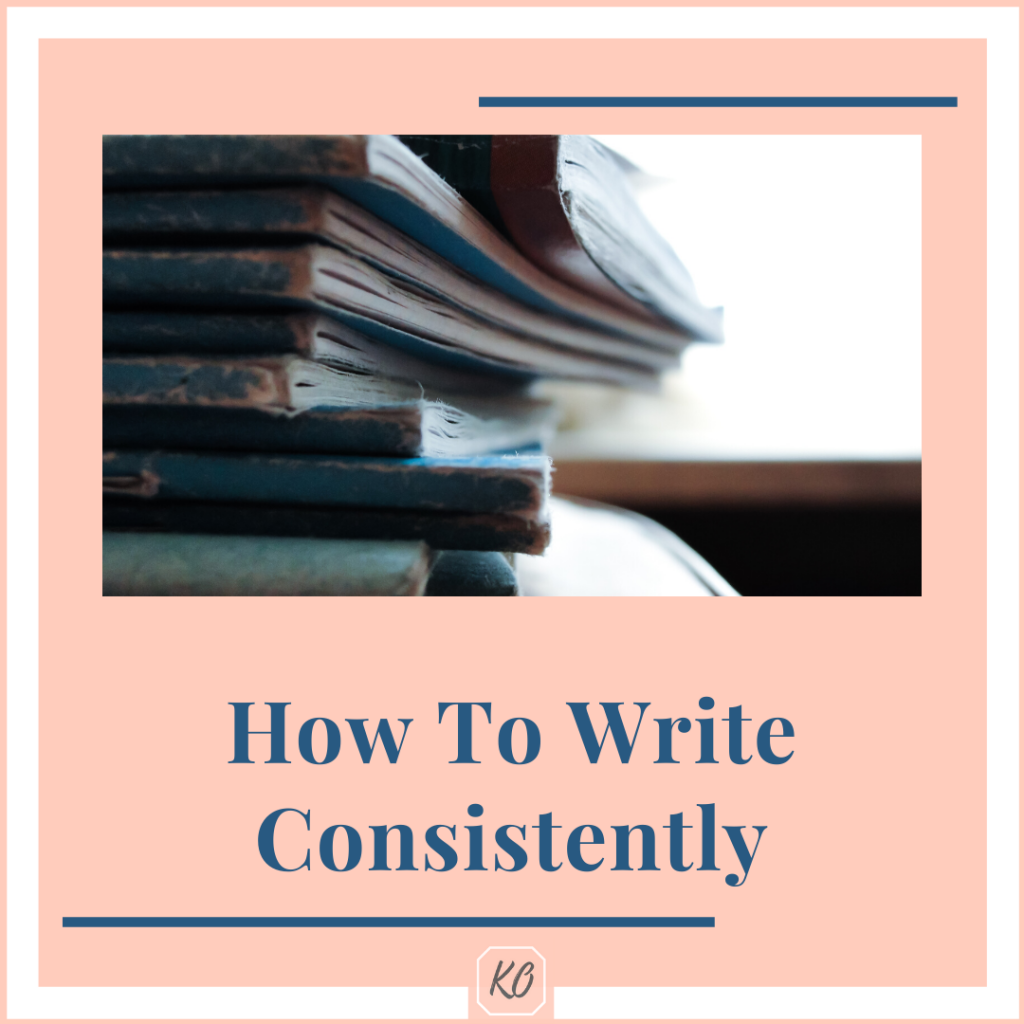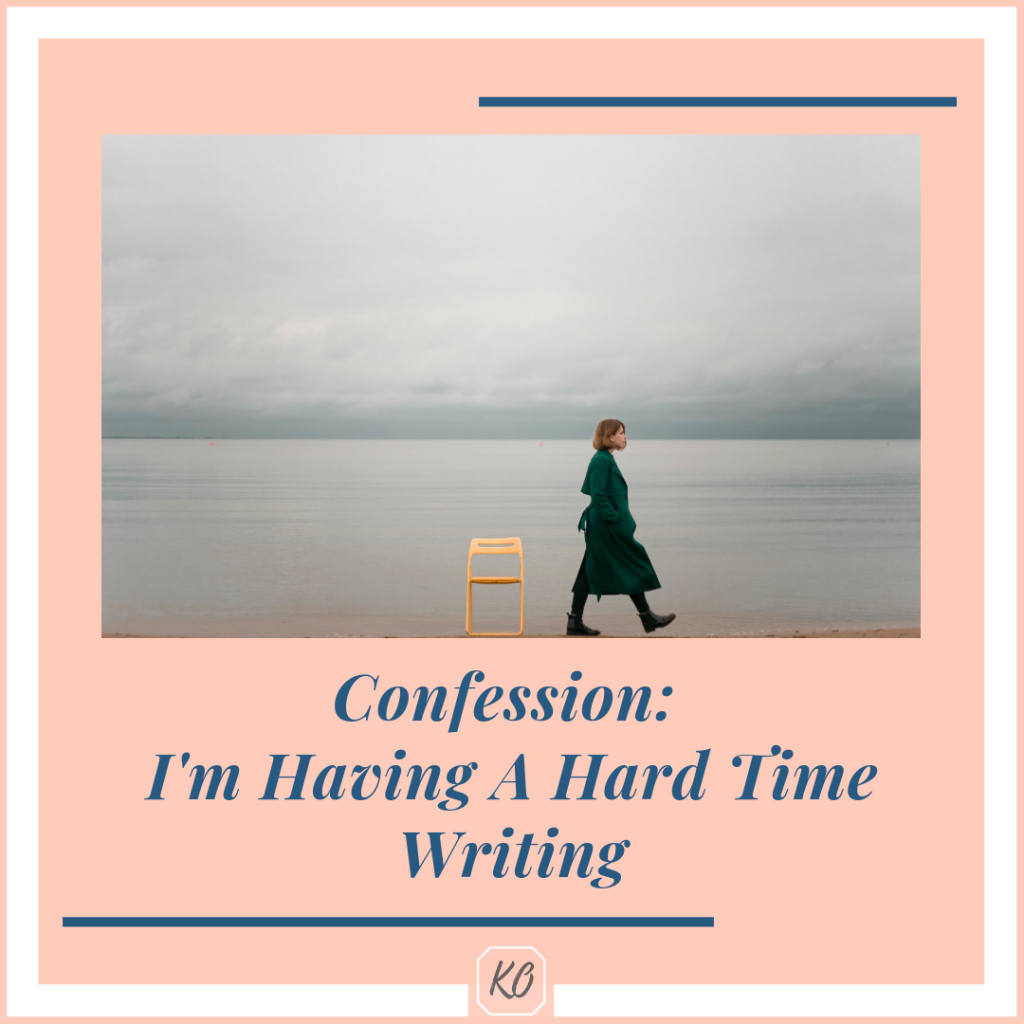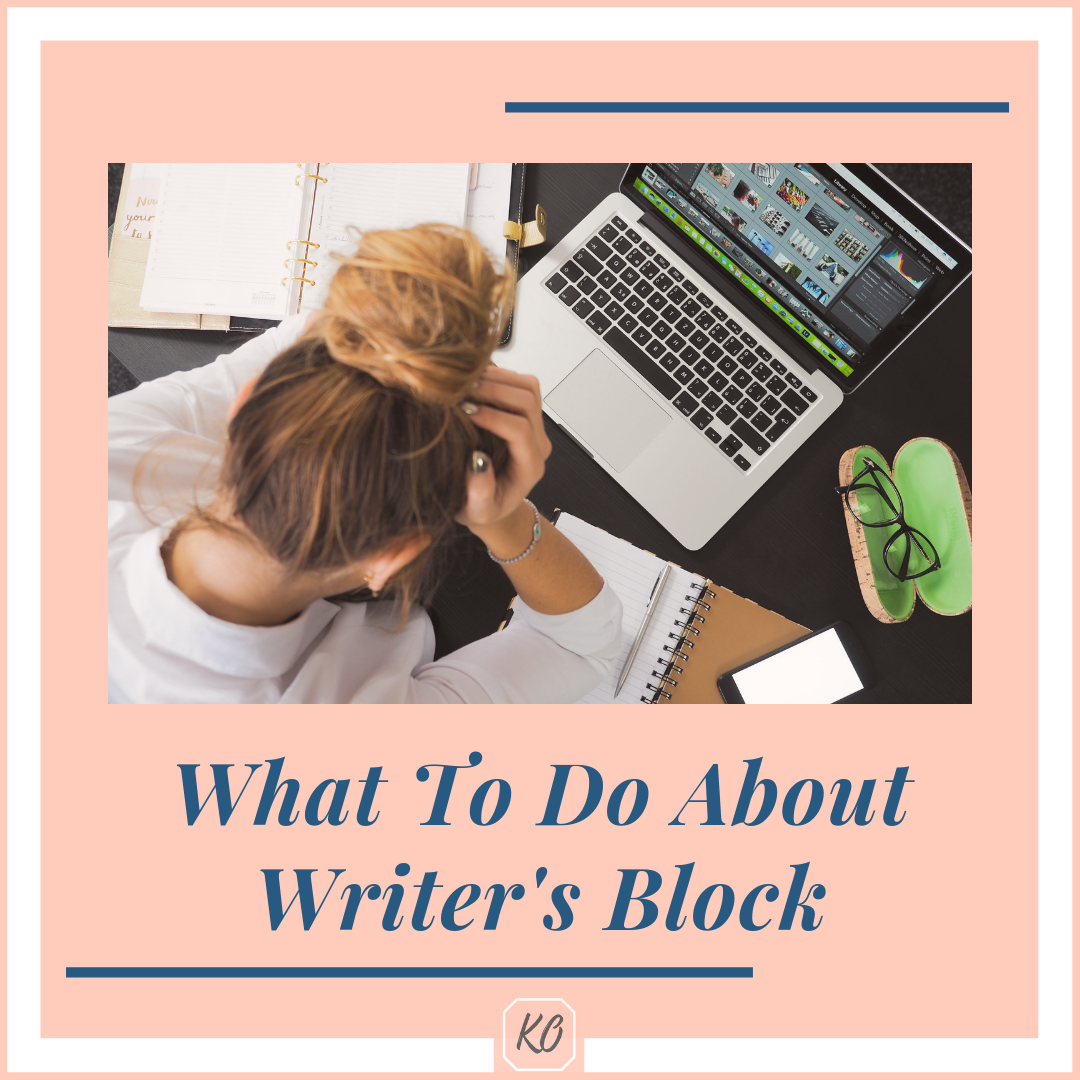You don’t have to write every day to be a “real” writer.
If that’s one misbelief holding you back from a great writing life, feel free to let it go.
The reality is, consistency is what matters.
And for each person, consistency will mean something different. Maybe for you, consistency is writing daily, or three times a week, or every single weekend. Maybe it’s writing on your lunch breaks four days a week or getting up early to write every other morning.
You’re a real writer if you write, not if you adhere to “rules” about how to be a creative person. Skipping a day of writing doesn’t negate all the previous work you did.
But how do you build consistency so you’re writing regularly if that’s something you have yet to master? Here are a few easy steps.
Create Momentum
One reason some people write daily is that it generates momentum, and once you’ve got some momentum behind your writing, it’s easier to write regularly. It’s also easier to combat resistance and self-doubt.
While you do not need to write daily to feel forward motion with your work, it can actually be a great tool in the beginning.
When I haven’t written in a while or I’m feeling kind of resistant or stalled out, that’s usually a good sign I need some momentum. So in that case, I’ll commit to writing daily for a certain period of time rather than “forever.”
I know there are benefits to writing daily, but it can feel defeating to believe “real” writers write every single day without fail. That’s just not true.
I set the bar low and give myself a lot of grace, but still make sure I’m writing something daily for my selected block of time. The habit of sitting down to write for 21, 50, 100 (or whoever many) days pushes me forward and actually makes writing easier.
Once I’ve gained momentum, I don’t have to sustain a strict daily writing practice.
However, I do need to stay connected to my writing, so I try to not go more than a couple of days between writing sessions. Anything longer and the process of re-entering the work is much harder for me. You may notice this too, or maybe it’s easier for you.
Either way, I think of my writing practice as me holding a thread that’s connected to my story.
Each non-writing day that passes, I feel my grip on the thread get a little looser. At some point, I’ll drop the thread entirely and have to work to find it again.
So I hold onto that thread to keep steady forward momentum and help my writing practice feel smoother.
Schedule Your Writing Time
This isn’t a revolutionary tip, but it does work.
I like to plan my writing in two phases: the overall time I think a project will take, and then the weekly steps I can take to get there. Scheduling it is how I get the writing done!
For example, while revising my novel, I work off a master revision schedule that tells me which chapters I’m working on each week and when the entire process should be wrapped up.
Then each week, I zoom in a bit closer and write out the specific things I need to do that week and add it to my schedule. I generally have the most time for writing on Wednesdays, so I might schedule two chapters of revision for that day, while the rest of the week I just focus on smaller sections within each chapter.
Whatever your process looks like, the key is just that you add your writing time to your schedule.
Make appointment blocks in your Google calendar and keep those meetings with yourself the same way you’d keep a meeting with someone else.
Your time is just as precious as someone else’s.
Or maybe you’ll take a looser approach and plan out a word count goal for the week. If you want to hit 1,000 words by the end of the week, designate how many words you’ll try to write on certain days and add it to your to-do list. Monday – 500 words. Thursday – 200 words. Saturday – 300 words.
Bottom line: help yourself be consistent by scheduling your writing and keeping those appointments like you would keep them for anyone else.
Be Flexible and Curious
The biggest problem with the adage that you must write daily to be a writer is that it’s inflexible.
And what most writers need is a lot of grace, flexibility, and curiosity in their life rather than rigid “rules” that only serve as a way to stoke perfectionism.
Writing isn’t something you’ll ever perfect. But what you can do is improve and learn and get better the more you practice.
If you want to write consistently, you must be flexible with yourself.
Be willing to begin again when you lose grip on the thread connecting you to your words.
Be curious about what you’ll discover if you commit to writing with regularity. Not just what you’ll discover in your own story, but within yourself.
Be excited to make a promise to yourself and stick with it, and be open to the possibility that you’ll build momentum for a while and then lose it, and need to start over. Be ok with all of it.
There’s no need for either/or thinking as a writer. This is an art form, a craft. You’re an artist who is learning and practicing, failing and succeeding.
You don’t need to sit at a desk and write for three hours every single morning to be an artist.
But you do need to sit with your work often, and with an open mind.
If you want to see progress, you’ll need to write regularly, even when it feels impossible. Even when you think you have nothing to say. Even when you’ve been away from the page for too long.
And don’t forget… join me on Instagram for new content all month long about how to write consistently.
Plus, you can download your free infographic on How To Write Consistently here.
If you’re already on my newsletter list, you can find your downloadable PDF already in your inbox! Just look for my newsletter, open it, and scroll down. Every monthly blog post will come with a downloadable resource to help you make the most of that month’s topic, so be sure to sign up here if you want in!
Tell me, do you have any habits that help you write consistently?
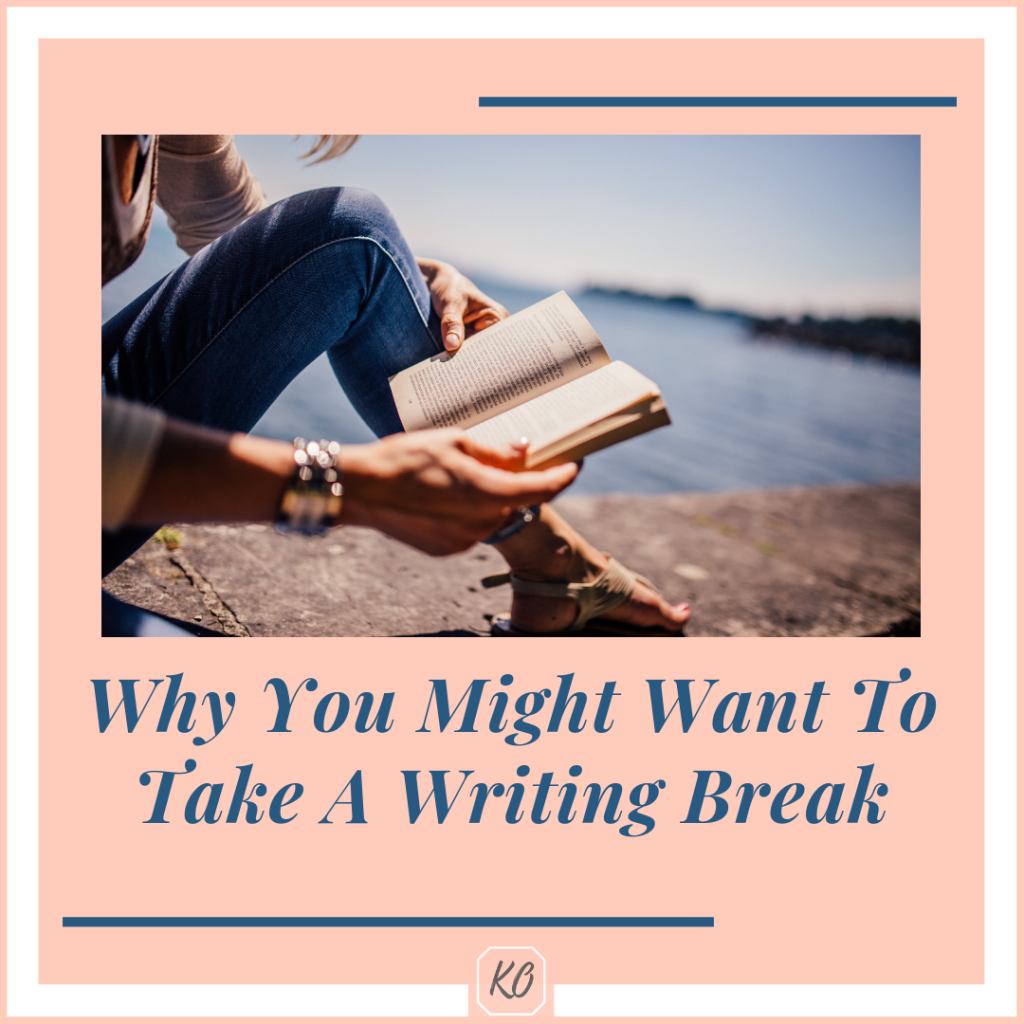
Resistance is a funny thing.
It looks different for everyone, but its purpose is always the same: to keep you from writing.
But what makes it funny is that sometimes the resistance is actually right. Not the parts of it that scream lies about your ability or your worth, no. That’s always wrong.
Sometimes, though, the resistance that keeps you from writing serves a purpose that ends up being surprisingly… helpful.
It may not seem so at the time. When I recently had a seven-week stretch of not being able to work on my novel, I definitely did not see how it could be helpful to have a break from writing.
In fact, the longer I went without working on my manuscript, the more frustrated I felt with myself. Instead of feeling like a good thing, the internal resistance felt pretty awful.
All I could think was how far behind I was falling, how many details I was forgetting in my story, how much longer it would take me to finish the draft once I started up again.
Yet every time I tried to work on it, the resistance won.
For a couple of weeks now, I’ve been writing my novel again. It was a bit of a process to re-enter the story, but now that I’ve got a grip on it, I’m making headway and feeling better about the last couple of months.
Not writing was, in fact, a positive thing. Here are my key takeaways that could help you, too.
Resistance Might Be A Signal To Slow Down
It can be hard to tell exactly what message your resistance is sending, but in my case, it was a clear sign to slow the F down for a minute.
Think of it like mental brakes. Sometimes you need to tap those suckers a little bit and ease off the intensity of forward motion.
I’m big into accomplishing things. I love a good list and I love being productive and crossing things off that list. So you can imagine how hard it is for me to feel stagnant.
At the time of that “stagnation” though, I was dealing with some health issues that were causing me a lot of physical pain, loss of sleep, and a huge dip in my mental wellbeing.
The last thing I needed was the added pressure of finishing a novel.
Taking a break from working on it actually meant I wasn’t forcing the writing when I wasn’t in the mental space to think about the novel.
A Break Is Refreshing
On one hand, I like to stay as close to my writing as possible so I can avoid the whole re-entry phase. It always feels like slogging through waist-deep mud the first few times I work on a long-forgotten piece.
But on the other hand, having seven weeks away from working on my book felt like a reset.
I didn’t stop writing altogether. I still wrote blog posts, newsletters, and freelance pieces. I even lightly revised a short story I want to send out.
I just never sat down to work on my manuscript during that time, and after it stopped feeling like weeks of wasted time, it started to feel like a breath of fresh air.
What I mean is, once I opened the document again and re-read the last chapter and a half that I’d written back in April, I realized the story wasn’t as messy as I thought and I wasn’t as stuck as I expected to be.
In fact, not worrying about plot or character development or subplots or the name of that person back in chapter four gave me a mental reset with my story.
I usually save this kind of thing for after a draft is complete, but it’s not a bad idea to give yourself some space from the text in the middle of writing it if you need to do that.
There Are Other Ways To Be Creative
Maybe your resistance is a cue to try something else for a little while until you make it back around to your writing.
There’s nothing wrong with putting writing aside for a little bit and flexing your creativity muscles in new ways.
In my life, some examples include learning to knit something I’ve never knit before, making jewelry, learning modern calligraphy, reading books I wouldn’t normally pick up, binging podcasts I love, spending more time with friends or family I don’t see often enough, refining my wardrobe, or even giving myself a great manicure.
You’re not a failure if you’re not writing.
You’re not doing something wrong as a creative person if you put your energy towards something else.
Tune into your resistance and listen closely. Is it telling you there’s a legitimate reason to take a break? Could it be possible that writing isn’t what you need right now?
Maybe. Trust that eventually you’ll make your way back to your writing and there won’t be much lost besides a little bit of time.
What do you do when you feel like you can’t write?
It was 1:45 a.m. and my two year old was awake with croup.
His cough sounded like a seal bark, his breathing was noisy and wheezy. We turned on the hot water in our shower to let the bathroom steam up, but that didn’t seem to help him much (it did, however, set off the smoke alarm which set off the house alarm. Fun.)
We decided to head to the emergency room and proceeded to spend six hours there while they gave him a steroid and then a breathing treatment.
I was running on fumes and two hours of sleep when we got home later that morning and, during his nap, decided to write this week’s blog post. It was supposed to be about beta readers – how to find them and when to use them.
But after struggling with the post for a little while, I realized it wasn’t the topic I wanted to write for this week with a very foggy, overwhelmed brain.
Instead, I wanted to tell you that for the last couple of months, writing has not felt easy for me.
For pretty much the entire month of April, I dealt with some excruciating, near-constant physical pain related to my autoimmune disease. I’ve certainly been in this boat before: when something painful and all-consuming happens with my health, writing falls by the wayside.
Pain is incredibly distracting. And sometimes creativity feels futile when health issues flare up.
However, I’ve still been writing blog posts and emails to my subscribers (are you on my list? If you sign up, you’ll get some great freebies!) because my desire to help other writers is greater than my physical issues.
I’ve also been writing pieces for my freelance work because I have deadlines and those pieces/clients matter a lot to me.
But lately, when I sit down to work on the final 10,000-ish words my novel, I simply… can’t.
I’m so close to the end of this first draft, and yet I feel totally paralyzed.
The strange part is that, in the midst of all this trouble writing, my short story was published. I’m SO happy it’s out in the world, and SO guilt-ridden that I’m in the middle of a creative drought.
Because honestly, that’s how it feels. My creative well is dry.
I feel like I should be so high off of seeing my first short story in print that it should propel me to finish revisions on another story and complete my novel draft. But that’s not the case, and I hate it.
I share this not to whine or complain, but to let you know that if you’re in the same place with your writing, you’re not alone. And it’ll pass.
Even though I know this from experience and I do believe this is just part of the ebbing and flowing of a creative life, it’s still really hard to feel resistance. I know all the practical ways to get past resistance and I’m well-versed in the tactics that work for me.
And yet…
Here we are. Here I am. Writing every week about making the most of your writing life while feeling stuck within my own. Wanting to help you finish all your beautiful, brilliant stories while feeling unable to do the same myself right now.
It’s ok, though. I truly do believe that!
It’s not necessary to constantly be productive. There are seasons with writing, as with most things in life. There are periods of time when the words will flow and times when they won’t, and the key to fending off total discouragement is to remember this will pass.
So while I wait it out, I’ll keep writing these posts for you and keep returning to the page and trying to make fiction happen.
Eventually, it’ll feel right again. It always does.
If you’re in a similar position, let me know in the comments what your biggest struggle is and how you’re dealing.
I have mixed feelings about writer’s block.
On the one hand, there have been times when writing has been impossible for me. I’ve actually felt the physical sensation of my words being blocked.
It’s like having an unscalable wall between the desire to write and the act of writing and not knowing what to do to move past it.
On the other hand, though, I know for sure that there are countless ways around and under and through that blocked feeling. It doesn’t have to stop you from doing your work.
While I do believe that the feeling of writer’s block is real, I don’t think it’s something that has legitimate power over writers. And I do think it’s fairly easy to defeat.
Here are some ways to do it.
See It For What It is
The paralyzing feeling of writer’s block is often a result of fear, boredom, insecurity, indecision or some other factor that brings your writing to a screeching halt. It’s uncomfortable and frustrating and sometimes feels endless.
But recognizing writer’s block for what it is — a form of mental resistance — can help end it fast.
Instead of letting writer’s block say something about who you are as a person, see it as a temporary condition you can work around.
It’s not a personal failure if you don’t feel like you can write right now.
It’s a moment in time where you must actively help yourself write. It’s temporary, and it’s just a hurdle you can overcome by taking deliberate actions.
Do The Opposite Of What Writer’s Block Tells You
It’s easy to feel complacent when writer’s block strikes. The block is telling you not to write because (insert false reason here) and your instinct might be to follow those instructions.
But don’t! That’s how perfectly good months or years of writing time slip away from a person, lost forever to a made-up affliction.
The only way the resistance wins is if you DON’T write. So putting even one sentence down on paper is a win for you and brings you a tiny bit closer to not feeling blocked.
When your writer’s block says don’t write, do the opposite. Write about anything you can for just a few minutes. Start small, but take action in the opposite direction of the resistance.
Address Other Factors Outside Of Writing
There’s a difference between depression, anxiety, or generally feeling sad versus having writer’s block. I want to make that distinction clear.
If you feel your writer’s block is a result of another issue, like a mental health problem or high stress levels or a medical condition, give yourself a break. It’s ok to cut yourself some slack, put writing on the backburner, and take care of yourself.
For many of us, ongoing health issues definitely play a role in our ability to write. I have a chronic autoimmune disease that sometimes causes fatigue, brain fog, and other physical issues that completely distract me from writing.
This is not writer’s block.
Writer’s block is rooted in a false belief we carry about our writing and/or our capabilities. Writer’s block is not a medical condition. It’s a way we feel resistance.
So if you do have a medical condition to contend with and it impacts your writing life, go easy on yourself. It’s ok to take time off from writing to get well.
If All Else Fails, Try Something New
Sometimes writer’s block is so intense it’s hard to fathom writing even a few sentences. Or maybe you can write a few sentences, but over time you realize it doesn’t help anything.
I don’t think it’s worth the energy to force yourself to do something over and over again if it feels lousy. Try something else instead.
There’s no law that says you have to overcome writer’s block by writing.
In fact, I think one of the best ways to get over a creative block is to do something besides write.
And not just any old thing, but something deliberate. Something that you think will give you a creative spark or some new ideas you can incorporate into your work.
See a play or a concert. Go to an open mic night and listen to others read their writing. Take a class. Learn a new skill that requires the use of your hands, like hand lettering or woodworking or knitting. Find a local museum (RISD is amazing if you’re in Rhode Island!) and spend a few hours wandering around.
You get the idea. Sometimes it takes a different approach than writing to overcome a bout of writer’s block.
And if all else fails, you can always spend the extra time reading. Eventually, you’ll find your way back to your writing!
Have you ever had writer’s block? How do you handle it? Tell me in the comments!

Back in 2012, I was fresh off my first post-MFA writing course, an online class called Story Is A State of Mind by Sarah Selecky. (It’s now called The Story Course and I’m one of the program teachers!)
At that point, I had already tried starting up a couple of local writing groups to fill the MFA-shaped hole in my heart, but those attempts ultimately failed because the participants weren’t committed.
But when Sarah held a live chat one day on her Facebook page, the conversation turned to the topic of writing groups.
I lamented my attempts at forming a local group when she suggested I form an online group with other Story Is A State of Mind students who were looking for a writing group, too.
A few of us then hopped on an email thread, organized our first meeting online (since we were spread across two countries), and the rest is history.
It’s been six and a half years and we’re still meeting on a monthly basis to give feedback on each other’s work. We’ve read short stories, plays, novels, essays, and more. We give one another honest feedback, we share resources, and we provide a space where we can each take risks and grow.
Here’s why you should have a writing group too, or at the very least a trusted writing partner, and how to get started once you’ve decided it’s right for you.
It Gives You A Break From Writing In A Vacuum
Let’s be real: writing is a solitary act. You’re alone in your own mind when you’re thinking through a project and you’re usually alone in your space when you’re writing.
Sometimes in the midst of that isolation, it’s nice to stick your head out of the cave and be seen, to have another writer to look at your work and share their thoughts. And it’s so much easier to have this need met when you’ve got a writing group or a writing partner you trust.
And when you experience writing wins, it’s so much sweeter to share them with your writing friends.
Workshopping Will Make You A Better Writer
If you’re not 100% sold on the idea that connection with other writers is important, maybe this will convince you of the value in having a writing group.
When you’re regularly reading and critiquing other writers’ work, you naturally begin to sharpen your own writing skills.
It’s simple: when you help another writer see what’s strong or what needs improvement in their work, your own editing eye will start to see those things in your own work, too.
You’ll start to better understand your own strengths and weaknesses. You’ll write stronger first drafts and have an easier time with revision. Your craft will become more refined.
And that’s in addition to helping your groupmates become better writers, too. Isn’t that worth it?!
How To Find The Right People
When I made my first few attempts at forming a writing group, I relied on Craigslist to put out a call for local members. (This was 2010 or 2011, so it’s really all we had!)
The problem with casting such a wide net is that our group was made up of people who didn’t mesh well and, frankly, didn’t care about each other’s work.
For example, there was one woman in the group who only showed up to meetings when her story was being workshopped. She didn’t contribute anything when it wasn’t her turn. The group only lasted a couple of months, and the meetings we did have were pretty disappointing.
Finding the right writers to connect with much easier today. You can potentially join a group that already exists if they’re seeking new members, or you can start your own.
If you’re starting your own group, first decide how many members you’ll have (I would say five or six is a good maximum number, especially at first) and how you’ll meet.
Do you want to see people in person? If so, search in your area for writers who will mix well together… and who are committed to the other group members. Don’t be afraid to tell potential members that you’re only seeking people who are as serious about giving feedback to others as they are about their own writing.
You might want to put out a call for members on social media, through people you know, or even other avenues like your local library or coffee shop. Those announcement boards can be cluttered, but they’re also a good way to connect.
If you’d rather start an online group like mine, you have a few more options.
Consider fellow classmates in online classes you’ve taken (that’s how my group began!) or find writers on social media, particularly Twitter or Instagram. Use writing hashtags or connect directly with people you think will be a good fit.
You can also ask friends and family if they know anyone who writes and might want to be part of a group.
Next Steps
Before your first meeting, decide on a few key things:
- How frequently will you be meeting? Monthly? Twice a month? Every other month?
- What is your workshop lineup? Who will go first, second, third, etc?
- How do you want meetings to be organized? In our group, we start the call with a quick hello and then dive right into our workshop. We each take a turn saying what we think the story is about, what’s working for us, and one thing we would recommend for revision. This helps us stay focused, but also allows us to organically jump in with other pieces of feedback as they arise.
- How long will your meetings be? Set this expectation early on to respect everyone’s time.
- What is the word count or page limit on workshop submissions?
- How much in advance of a meeting should the writer send their piece to the group?
- How will you be meeting, if not in person? Skype? FB Messenger?
After your first meeting, reflect on what went well and what you want to improve upon next time.
The first few meetings might be awkward as you figure it all out, but don’t get discouraged. It can take some time before a writing group begins to hit its stride.
And if, over time, you realize it’s just not working out don’t feel bad about calling it quits and trying again. When you have the right group, you should feel inspired, excited, and fulfilled after your meetings.
If you come away feeling anything less than that, maybe it’s not a good fit.
But the perks of having a writing group or a writing partner are so plentiful, it’s worth looking for the right people and giving them your all when you do find them!
